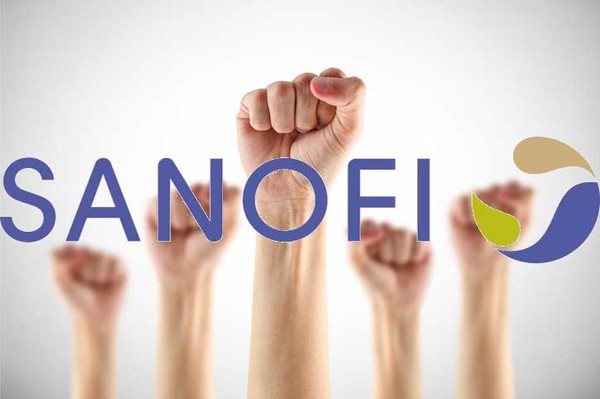Labor union members of Sanofi Aventis Korea, the offshoot of the French-based multinational pharmaceutical company, have filed a lawsuit against the company's general manager and human resources head for failing to pay overtime allowances.

The union filed a lawsuit on behalf of four of its members on April 20 for violating the Labor Standards Act by improperly operating the flexible working hour system outside the workplace and not providing overtime pay.
The work system recognizes working hours when it is difficult to calculate working hours due to business trips or outside of the company. After Korea adopted the 52-hour workweek system in July 2018, most pharmaceutical companies applied the flexible working hour system to employees working outside their offices or plants, such as salespeople.
"The unpaid wages of the four complainants for three years from April 2019 to April last year is 11 million won ($8,691)," union leader Park Young said.
Park stressed that filing a lawsuit was never the initial intention.
Park explained that working eight hours a day is a regular working day, but there are many times when employees must work more than eight hours. "Employees have to attend or support seminars and symposiums even after work," he told Korea Biomedical Review over the phone. "When we added in such additional work hours, the work time of a typical sales employee was 8.3 hours."
Therefore, he added, the union requested to hold a discussion to designate a set working time as agreed upon between the union and the company.
When the company declined, the union asked for mediation with the National Labor Relations Commission (NLRC) on behalf of 120 employees but failed to conclude.
"The company said that its system is fine as the flexible working hour system allows sales personnel to work flexibly. It is only a problem for some managers," Park said. "However, we are not talking about the problem of some managers, and when a company implements a flexible working hour system, it is necessary to establish guidelines for all sales representatives."
Park noted that the company also said that salespeople work after 6 p.m. for three hours a month.
"The management said that because they are adopting a flexible working hour system, employees can choose when to work the next day, so it is not required to pay overtime," he said. "However, the flexible working hour system is based on the rule that we work eight hours a day, not 12 hours."
Therefore, he added that the company is obligated to pay overtime for any work after eight hours.
According to Park, it is not the only regulation Sanofi has violated.
"Sanofi has also been violating the Labor Standards Act by regularly checking commuting hours or where their sales representatives are at some specific times," Park said.
According to the guidelines issued by the Ministry of Employment and Labor, if a company introduces a flexible working hour system, it cannot force employees to go to work or leave work at a specific time or keep tabs on their location or visit records.
"The managers claim to have a flexible working hour system. However, they receive commuting reports and further check our work by checking up on the materials generated while doing business," Park said.
Park stressed that besides the four union members that have filed a lawsuit against the company, the union is also preparing to file a lawsuit demanding the settlement of unpaid wages for 136 more employees.
The union estimates their unpaid wages amount to 400-500 million won.
"The company has adopted the flexible working hour system to avoid overtime payment," Park said.
Regarding the union's lawsuit, a labor attorney said it is essential for the union to submit detailed and well-prepared documents proving the arrears of wages.
"If the payment of wages is found unsatisfactory by the labor inspectorate who investigates the case, it is punishable by imprisonment for a maximum of three years or a fine not exceeding 30 million won," labor attorney Kim Kyung-rak said. "In addition to punishing those in charge of giving out wages, a fine may also be imposed on the top management officials of the company."
However, as unpaid wages do not exceed 1 billion won, even if the labor inspectorate finds any wrongdoing by the company, they will likely be only slapped with a fine, Kim added.
Kim noted that the authorities could not punish against the complainant's will, so even if they find any wrongdoing after the investigation, punishment if the complaint pays the unpaid wages is extremely low.
Sanofi Aventis Korea said there is no legal problem with their flexible working hour system.
"The company has legally applied the flexible working hour system outside the workplace under the Labor Standards Act within the legal framework,” a company spokesperson said. “Nevertheless, the company finds it regrettable that such an accident happened.”
The official stressed that after reviewing the relevant data, the company confirmed that there were no unpaid wages to the employees.
“As in the past, we will faithfully explain the company's position to relevant organizations and employees,” the official said.

